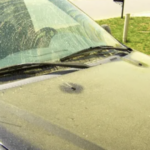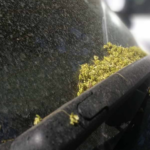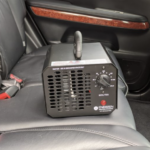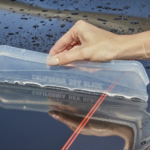Does Every Car Need Paint Correction? When and When To Do It
One of the most common questions we get at Orlando Detailing is whether every car needs paint correction. The answer, however, isn’t as straightforward as a simple “yes” or “no.” The necessity of paint correction depends on a variety of factors, including the car’s age, paint condition, intended use, and the level of aesthetic perfection you’re aiming for. In this post, we’ll dive deep into when paint correction is essential, when it’s not, and why it matters in maintaining your car’s appearance and value.
What Is Paint Correction?
Paint correction refers to a detailed process of removing imperfections from a car’s paint surface. This process typically involves the use of machine polishers and specialized compounds to smooth out swirls, scratches, oxidation, water spots, and other blemishes. The goal is to restore the paint to its original luster and depth, ultimately giving the vehicle a showroom-quality finish.
Paint correction can range from light polishing to more aggressive methods, depending on the severity of imperfections. A successful paint correction not only improves the car’s appearance but also enhances the longevity of the paintwork. This is done after a clay bar treatment for decontamination by removing the imperfections that could otherwise lead to further damage.
When Is Paint Correction Necessary?
Not all cars require paint correction, but there are several scenarios in which it becomes necessary:
1. Swirl Marks and Scratches
The most common reason for paint correction is the presence of swirl marks and scratches. These imperfections typically occur due to improper washing or drying techniques, such as using dirty towels, automatic car washes, or rough sponges. If these blemishes cover a significant portion of your vehicle’s paint, paint correction can help eliminate them.
2. Oxidation and Faded Paint
If your car has been exposed to harsh environmental conditions, the paint might start to oxidize. This leads to a dull, faded appearance that can make the car look older than it really is. Paint correction helps to restore the shine by removing the oxidized layers and revealing the fresh paint underneath.
3. Water Spots and Hard Water Stains
Water spots can form when water droplets dry on your car’s paint, leaving mineral deposits behind. These can be especially challenging to remove and might require paint correction, particularly if left for a prolonged period. Over time, water spots can etch into the paint, leading to permanent damage if not addressed early.
4. Heavy Contamination
If your car’s paint has become heavily contaminated with tar, tree sap, bird droppings, or industrial fallout, it may require paint correction. Contaminants like these can cause long-term damage to the paint if they’re not properly cleaned and any damage caused polished away.
5. Showroom-Quality Finish
If you’re looking to achieve a perfect, showroom-quality finish on your car, paint correction is essential. This is especially true for car enthusiasts, collectors, or anyone who wants their vehicle to look flawless. Whether for a car show or simply for pride of ownership, a paint correction can take your car’s appearance to the next level.
6. Prepping for Ceramic Coating or Waxing
Before applying a ceramic coating or a high-end wax to protect the paint, a thorough paint correction is recommended. By removing imperfections, you ensure the protective layers adhere properly and provide the maximum benefit.
When Is Paint Correction Not Necessary?
While paint correction can work wonders, it’s not always required. Here are some scenarios when you can skip the correction process:
1. Brand New Cars
If you’ve just purchased a new car and it’s in good condition with no significant blemishes, paint correction may not be necessary. Most new cars come with factory-applied finishes that are already in top-notch condition. Unless you notice minor imperfections like light swirl marks from dealer prep or transport, you can likely skip the correction process and focus on regular maintenance.
2. Minor Imperfections
If your car has minor imperfections that don’t bother you or significantly affect its appearance, paint correction may not be worth the investment. For instance, light surface scratches that aren’t easily noticeable and don’t affect the overall shine of the car can often be ignored. Opting for a quick detail or spot polishing might be all you need.
3. Temporary Damage
Certain types of damage, like tree sap or bird droppings, can often be cleaned off without the need for paint correction. If the damage is minor and you catch it early, a good cleaning with specialized products might be sufficient. However, waiting too long could lead to staining or permanent etching, at which point paint correction might be necessary.
4. Budget and Time Constraints
If you’re working within a budget or time frame, paint correction might not be necessary. While the results are impressive, it’s an intensive process that can take several hours or even days, depending on the car’s size and the extent of the damage. If your goal is simply to enhance the car’s appearance on a budget, you might opt for a simpler detailing service like a wash, wax, or polish.
5. Older Cars with Extensive Damage
In some cases, paint correction may not yield the best results for very old cars with extensive paint damage. If the paint has been worn down to the primer or has major peeling, paint correction can only do so much. In these cases, a repainting job might be a better investment to restore the car’s overall appearance.
The Benefits of Paint Correction
Whether or not paint correction is necessary for your car, there are several key benefits to the process:
1. Improved Aesthetic Appeal
A major benefit of paint correction is the immediate enhancement of the car’s appearance. By eliminating imperfections, you restore the shine and depth of the paint, leaving the car looking fresh and well-maintained.
2. Long-Term Protection
When imperfections are removed, the surface of the paint becomes more uniform, allowing for better protection from environmental contaminants. This means your car will stay cleaner longer, and the protective layers of wax, sealants, or ceramic coatings will last longer as well.
3. Increased Resale Value
A car that looks well-maintained and free of imperfections is more likely to command a higher resale value. Paint correction can boost the car’s appearance, making it more appealing to potential buyers who might otherwise be deterred by cosmetic flaws.
4. Restores Shine and Depth
Over time, car paint can dull from exposure to UV rays and contaminants. Paint correction restores that lost gloss, bringing back a deep, reflective shine that makes the vehicle look brand new.
Conclusion: Is Paint Correction Right for Your Car?
Paint correction is an excellent service that can work wonders for vehicles that show signs of wear, environmental damage, or simply need a professional touch to restore their aesthetic appeal. However, it’s not always necessary, especially for newer cars or those that have minor cosmetic issues.
Before deciding whether to go through the time-consuming and sometimes expensive process of paint correction, assess the condition of your car’s paint and your overall goals. If you’re aiming for a showroom-quality finish or have a car that’s seen better days, paint correction could be a great choice. However, if your car is in good condition and the imperfections are minimal, a simpler solution may suffice.
Ultimately, understanding the benefits and when it’s necessary can help you make an informed decision. In any case, whether you choose to go ahead with it or not, regular maintenance and care will ensure your car remains looking its best for years to come
Leave a Comment Cancel Comment
Book Orlando Mobile Detailing
Search
Latest Post
-
 The Cost of Neglect: Why Regular Aircraft Detailing Saves Money in the Long Run
February 14, 2025
The Cost of Neglect: Why Regular Aircraft Detailing Saves Money in the Long Run
February 14, 2025
-
 Why Car Washes Aren’t Enough to Combat Pollen Damage
February 13, 2025
Why Car Washes Aren’t Enough to Combat Pollen Damage
February 13, 2025
-
 Orlando’s Pollen Problem: When Is It the Worst and How It Affects Your Car
February 13, 2025
Orlando’s Pollen Problem: When Is It the Worst and How It Affects Your Car
February 13, 2025
-
 How Ozone Generators Eliminate Stubborn Car Odors in Orlando
February 12, 2025
How Ozone Generators Eliminate Stubborn Car Odors in Orlando
February 12, 2025
-
 Why a Water Blade and Chamois Beat Towels Every Time!
February 9, 2025
Why a Water Blade and Chamois Beat Towels Every Time!
February 9, 2025
